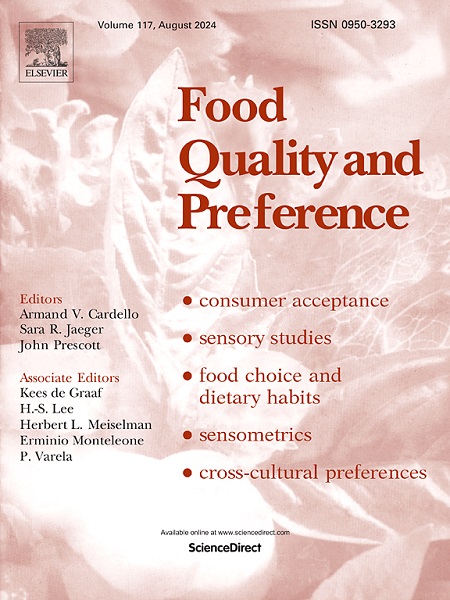社会心理预测因素和框架效应在接受新的基因组技术处理奶酪:证据来自一个代表性的意大利样本
IF 4.9
1区 农林科学
Q1 FOOD SCIENCE & TECHNOLOGY
引用次数: 0
摘要
新的基因组技术(NGTs)使精确的基因修饰成为可能,并在食品安全和可持续性方面提供了潜在的改进。尽管有这些好处,消费者的怀疑态度——尤其是在像意大利这样文化丰富的食品环境中——对接受构成了障碍,特别是对奶酪等传统产品。本研究考察了利益框架(健康vs.可持续性)和社会心理因素如何影响意大利消费者对用NGTs生产的奶酪的态度和购买意愿。1007名意大利成年人参加了一项具有全国代表性的在线调查。参与者被随机分配到两个框架条件中,强调ngt处理奶酪的健康相关益处(提高安全性)或可持续性相关益处(延长保质期)。健康框架比可持续框架产生了更多的积极态度和更高的购买意愿。使用食物相关行为的生态框架,通过多元线性回归,分别对两种情况进行社会心理预测分析。购买意向的关键预测因素包括对ngt处理奶酪的积极态度和低水平的食品技术新恐惧症。社会影响对两个群体都有积极影响,而对当局的信任只有在健康状况下才显著。食物多样性寻求和社会肯定表现出框架特异性效应。这是第一个在意大利具有重要文化意义的食物奶酪背景下调查消费者对NGTs接受程度的研究。它突出了基于健康的框架的说服力,并强调了个人和社会因素在形成接受度方面的作用。研究结果为在传统市场推广ngt衍生食品的传播策略提供了实用指导。本文章由计算机程序翻译,如有差异,请以英文原文为准。
Psychosocial predictors and framing effects in the acceptance of new genomic techniques-treated cheese: Evidence from a representative Italian sample
New Genomic Techniques (NGTs) enable precise genetic modifications and offer potential improvements in food safety and sustainability. Despite these benefits, consumer scepticism—especially in culturally rich food contexts like Italy—poses a barrier to acceptance, particularly for traditional products such as cheese. This study examines how benefit framing (health vs. sustainability) and psychosocial factors influence Italian consumers' attitudes and purchase intentions towards cheese produced with NGTs. A nationally representative sample of 1007 Italian adults participated in an online survey. Participants were randomly assigned to two framing conditions emphasizing either health-related benefits (improved safety) or sustainability-related benefits (extended shelf life) of NGT-treated cheese. Health framing generated significantly more positive attitudes and higher purchase intentions than sustainability framing. Psychosocial predictors were analysed using the Ecological Framework of food-related behaviour through multiple linear regressions, separately for the two conditions. Key predictors of purchase intention included positive attitudes towards NGT-treated cheese and low levels of food technology neophobia. Social influence positively impacted both groups, while trust in authorities was significant only under the health condition. Food variety seeking and social affirmation showed frame-specific effects. This is the first study to investigate consumer acceptance of NGTs in the context of cheese, a culturally significant food in Italy. It highlights the persuasive power of health-based framing and underscores the role of individual and social factors in shaping acceptance. The findings offer practical guidance for communication strategies aiming to promote NGT-derived foods in traditional markets.
求助全文
通过发布文献求助,成功后即可免费获取论文全文。
去求助
来源期刊

Food Quality and Preference
工程技术-食品科技
CiteScore
10.40
自引率
15.10%
发文量
263
审稿时长
38 days
期刊介绍:
Food Quality and Preference is a journal devoted to sensory, consumer and behavioural research in food and non-food products. It publishes original research, critical reviews, and short communications in sensory and consumer science, and sensometrics. In addition, the journal publishes special invited issues on important timely topics and from relevant conferences. These are aimed at bridging the gap between research and application, bringing together authors and readers in consumer and market research, sensory science, sensometrics and sensory evaluation, nutrition and food choice, as well as food research, product development and sensory quality assurance. Submissions to Food Quality and Preference are limited to papers that include some form of human measurement; papers that are limited to physical/chemical measures or the routine application of sensory, consumer or econometric analysis will not be considered unless they specifically make a novel scientific contribution in line with the journal''s coverage as outlined below.
 求助内容:
求助内容: 应助结果提醒方式:
应助结果提醒方式:


